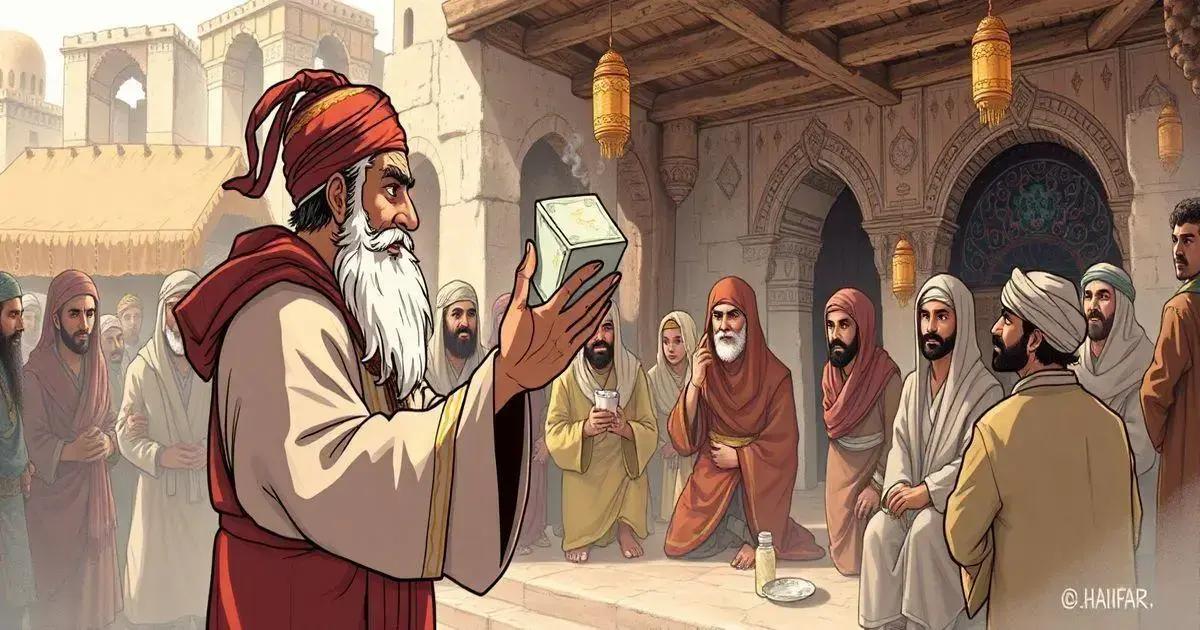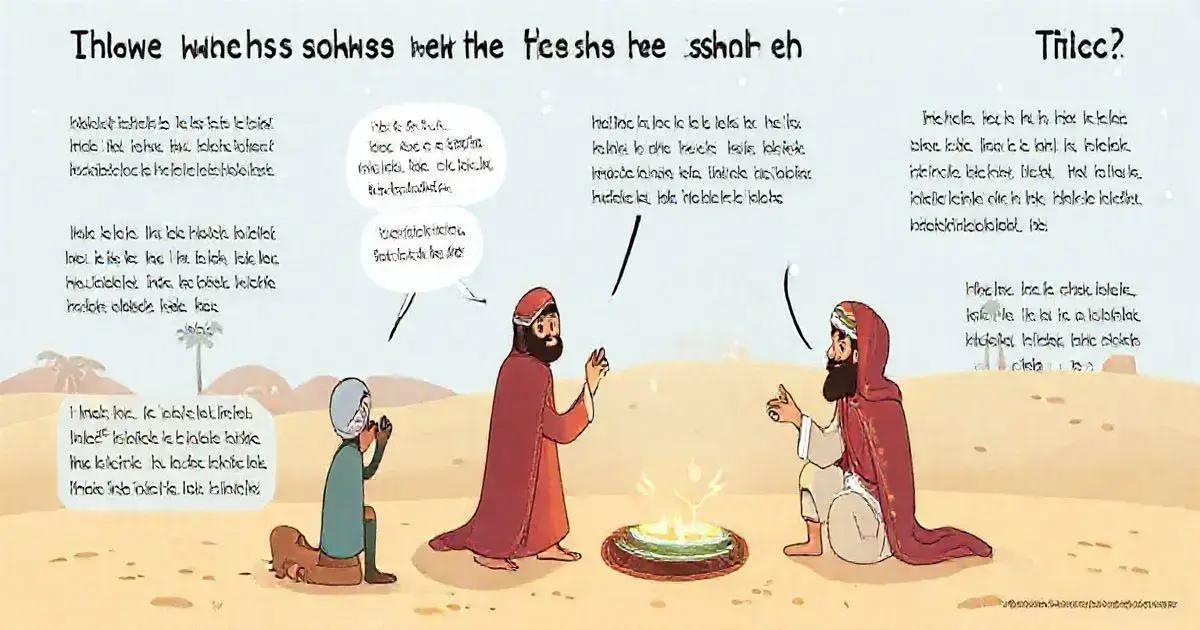The Arab Sheikh’s Trick is a fascinating folklore that illustrates themes of cleverness and wit in Arab culture, revealing its historical roots, cultural significance, and real-life applications through engaging stories that teach valuable life lessons.
The intriguing tales surrounding the “Arab Sheikh’s Trick” often blur the lines between myth and reality. This legend has captivated the imaginations of many, leading to questions about truthfulness in storytelling. In this post, we will delve into the origins of this trick, debunk common myths, explore its cultural significance, and share real-life examples that illustrate its impact. Join us on this journey to uncover the reality behind the legend!
Understanding the Origins of the Arab Sheikh’s Trick

The Arab Sheikh’s Trick has roots deeply embedded in the folklore of the Arab world. This trick often symbolizes cunning, cleverness, and the mastery of trickery, traits highly regarded in some cultural narratives. Many tales claim that sheikhs used these tricks to resolve disputes or to entertain guests, highlighting a balance of wit and wisdom.
Historical Context
Historically, sheikhs were respected leaders in their communities, often mediating conflicts and guiding people. The concept of using tricks as a teaching tool reflects the rich oral tradition where stories were central to imparting life lessons. Tales of clever sheikhs often served as moral stories that encouraged wit over brute force.
Influence of Oral Tradition
The oral tradition has preserved countless legends, allowing stories of the Arab Sheikh’s Trick to transcend generations. These stories include exaggerated feats of deception, revealing human creativity and resilience. Narratives passed down through families or communities became part of local folklore, shaping perceptions and beliefs.
Folkloric Function
In many cultures, the sheikh’s trick serves as a form of social commentary. It often critiques authority or social norms, allowing the underdog to triumph through cleverness rather than confrontation. This aligns with the broader function of folklore, which is to challenge societal structures and evoke thought.
Understanding the origins of the Arab Sheikh’s Trick allows us to appreciate its role in cultural identity. It reflects a tapestry of values, ethics, and humor that has evolved over time, making it an enduring element of Arab storytelling.
Common Myths and Misconceptions

Many myths and misconceptions surround the legend of the Arab Sheikh’s Trick. These often stem from misunderstandings of the culture and the stories passed down through generations.
Myth 1: It’s Just a Simple Magic Trick
One common myth is that the Arab Sheikh’s Trick is merely a form of magic used for entertainment. In reality, it is a cultural narrative designed to teach lessons about wisdom, cleverness, and the complexities of social interactions.
Myth 2: All Sheikhs Are Deceivers
Another misconception is that all sheikhs are deceitful figures. While some stories portray them as tricksters, many sheikhs acted with integrity and used cleverness to resolve disputes fairly. The trickery often symbolizes wisdom and is not limited to dishonesty.
Myth 3: The Stories Are All Fictional
People often believe these tales are entirely fictional. However, many stories are based on real historical figures and actual events adapted into folklore. This blending of fact and fiction enhances the tales’ moral lessons and their relatability.
Myth 4: They Are Only Relevant to Arabs
Some think these stories are only significant within Arab culture. Yet, the themes of cleverness and wisdom resonate universally, making the stories relevant to various cultures and encouraging cross-cultural understanding.
Recognizing these myths helps foster a deeper appreciation for the lessons embedded in the Arab Sheikh’s Trick and its impact on cultural narratives.
Cultural Significance in Arab Society

The cultural significance of the Arab Sheikh’s Trick extends beyond mere entertainment; it plays a vital role in shaping social values and norms in Arab society.
Tradition of Storytelling
Storytelling is a cherished tradition in Arab culture. Tales of the Sheikh’s Trick often reflect shared experiences, morality, and cleverness. These stories are used in family gatherings and community events to foster a sense of belonging and community.
Lessons of Wisdom
Each tale serves as a vessel carrying important lessons. They teach values such as wit, intelligence, and morality, which are essential traits in Arab societies. The Sheikh’s Trick embodies the idea that cleverness can navigate through challenges and conflicts.
Reflecting Social Issues
Many stories encapsulate social issues, highlighting the struggles between tradition and modernity. They provide commentary on societal norms, encouraging audiences to think critically about their situations. This reflection allows for discussions about moral dilemmas within a cultural context.
Community Bonding
Sharing these stories helps strengthen ties within communities. Through laughter and shared experiences, people find common ground, promoting unity and understanding among diverse groups. The Sheikh’s Trick is more than a story; it represents a collective identity.
Thus, the cultural significance of the Arab Sheikh’s Trick demonstrates how folklore enriches social life, serves as a teaching tool, and creates connections among people.
Real-life Examples and Stories

The Arab Sheikh’s Trick has inspired many real-life stories that illustrate its themes of cleverness and wit in practical situations.
Story 1: The Wise Merchant
In a bustling marketplace, a merchant faced a rival who tried to outsmart him. Remembering tales of the Sheikh’s Trick, he used a clever ruse. He exaggerated the price of his goods to draw attention. The rival, thinking the merchant was desperate to sell, rushed to undercut him. Ultimately, the merchant sold out at a better price, proving that wit can outshine raw competition.
Story 2: The Fisherman’s Gamble
A fisherman was struggling to catch enough to support his family. Inspired by the tales of the Arab Sheikh, he devised a plan to create a false light at sea. Many boats followed the glow of his lantern, believing it to be the best catch. However, he skillfully guided them away from the best fishing spots, allowing him to have a more fruitful day while teaching them a lesson in humility.
Story 3: The Diplomatic Sheikh
In a time of tribal conflict, a Sheikh used his intellect to resolve disagreements. He invited leaders from opposing sides for a feast. Through entertaining storytelling, he subtly pointed out the foolishness of their rivalry. With laughter and clever conversation, he convinced them to set aside their differences and unite in peace, embodying the essence of the Sheikh’s Trick.
Story 4: Modern Adaptations
In contemporary times, the essence of the Arab Sheikh’s Trick shines through social media. Many influencers use clever storytelling to engage and teach their audiences. Whether through humorous videos or thought-provoking posts, these narrators keep the spirit of the Sheikh’s Trick alive, demonstrating that wisdom and wit remain relevant today.
These real-life examples show how the themes from the Arab Sheikh’s Trick have practical applications, revealing that cleverness continues to play a crucial role in everyday life.
Exploring the Legacy of the Arab Sheikh’s Trick
The tales of the Arab Sheikh’s Trick offer more than mere entertainment; they provide insights into Arab culture and values. These stories celebrate cleverness, wisdom, and the importance of community, showcasing how folklore continues to be relevant.
From understanding its origins to debunking myths and appreciating its cultural significance, we see that the Arab Sheikh’s Trick encapsulates the richness of human experience. Real-life examples illustrate the timeless nature of these lessons, reinforcing that cleverness and wit remain essential traits in our modern lives.
Ultimately, the Arab Sheikh’s Trick serves as a reminder of the power of storytelling in bridging generations and cultures, fostering connection and mutual understanding.
FAQ – Frequently Asked Questions about the Arab Sheikh’s Trick
What is the Arab Sheikh’s Trick?
The Arab Sheikh’s Trick is a popular folkloric tale that emphasizes cleverness and wit in resolving conflicts and challenges.
Are the stories of the Arab Sheikh’s Trick purely fictional?
While some elements may be exaggerated, many stories are based on historical figures and real-life events that have been adapted for narrative purposes.
What cultural values do these stories represent?
These tales reflect important values such as intelligence, community bonding, and the significance of moral lessons in Arab society.
How do these stories connect to modern life?
The themes of the Arab Sheikh’s Trick continue to resonate today, as they teach us the importance of cleverness and problem-solving in various everyday situations.
Can you share a real-life example of the Arab Sheikh’s Trick?
One example is a wise merchant who cleverly outsmarted a rival in the marketplace by using a ruse that showcased his wit and secured better sales.
Why is storytelling important in Arab culture?
Storytelling is a vital tradition that fosters community, preserves cultural heritage, and teaches valuable life lessons through engaging narratives.













